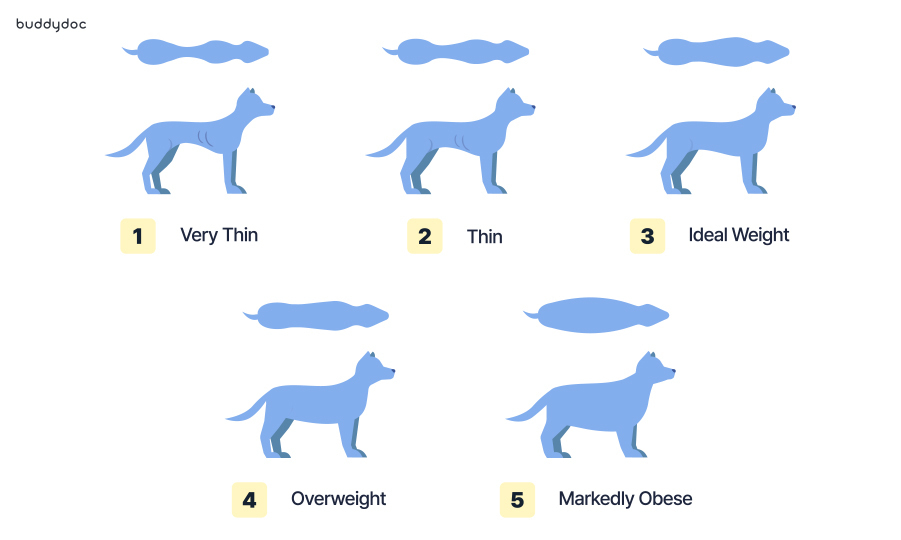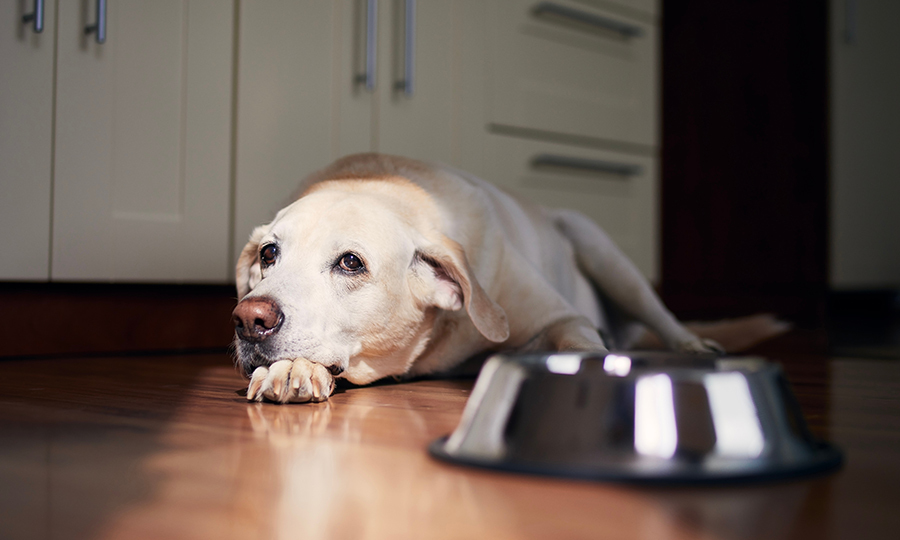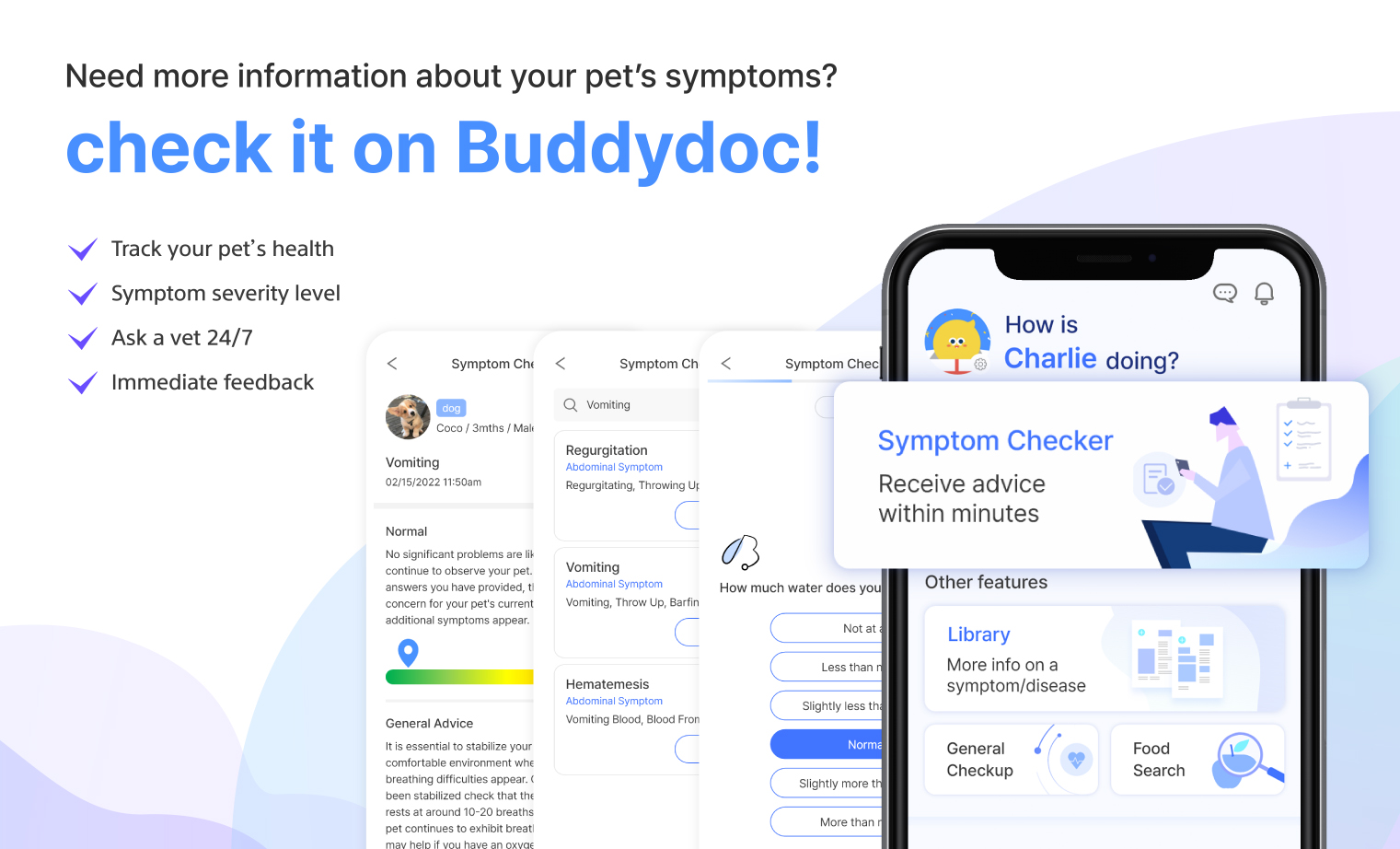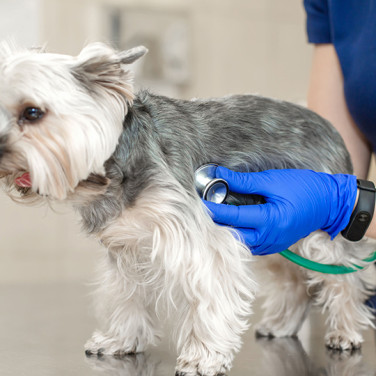SYMPTOMS
Sudden Weight Loss in Dogs - Common Causes and What to Do
페이지 정보
본문


What is weight loss in dogs?
Weight loss is a natural process that happens when there is a reduction in fat or muscle mass. This typically occurs when the number of calories consumed is less than the number of calories required by your dog’s body. The causes of weight loss can be categorized into two main groups: disease-induced causes and non-disease-induced causes.
Sometimes weight loss can be temporary and caused by changes in one's nutritional status or living environment. However, if a pet loses more than 10% of their normal weight, it should be considered a pathological condition.
BCS scale for dogs

Using the Body Condition Score (BCS) is a helpful method to evaluate your dog’s current physical condition. However, if your dog shows an abnormal weight loss of more than 10% of your body weight, it should be considered a pathological condition, even if your weight is within the normal range. It is important to note that losing weight quickly in a short amount of time is not healthy and should be checked with a veterinarian to rule out any underlying causes.
Causes of sudden weight loss in dogs

Common causes of weight loss
-
Changes in diet
Weight loss can occur if the amount of food intake is reduced or the quality of the food has been compromised. If there has been a sudden change in the dog’s diet, appetite can decrease, or the dog may not enjoy the new food provided. Transitioning a dog’s diet to a new food should take some time for the dog’s body to adjust to the new protein.
-
Changes in environment
If your dog's recent activity has increased, their energy consumption may also increase, which can lead to weight loss. This is particularly true if your dog is currently pregnant, lactating, or a young puppy in the growing phase, as their energy needs are high and weight loss may occur if these needs are unmet.
Furthermore, if your dog has recently experienced a stressful situation, it's possible that their appetite may decrease. For instance, dogs can become stressed due to a variety of environmental factors, such as a recent move or difficulty adjusting to a new environment, the presence of a stranger or other animals in the house, severe thunderstorms, or sudden cold weather.
Weight loss due to disease
-
Digestive disease
When experiencing vomiting or diarrhea, it is possible for calorie intake to be impaired, and difficulty with swallowing due to laryngopharyngeal disorder can lead to weight loss. Weight loss can also be associated with an impaired ability to digest and absorb nutrients as a result of multiple digestive disorders, including inflammatory bowel disease, lymphangiectasis, severe intestinal parasites, and exocrine pancreatic insufficiency.
-
Conditions that cause pain and weakness
If your dog has sores in their mouth, broken teeth, or inflamed gums, it can be challenging to chew their food properly due to the pain. Certain diseases of major organs like the heart, liver, and kidney, or severe pain from conditions such as disc disease, can weaken the body and cause a loss of appetite, which can result in weight loss.
-
Tumor
In the presence of a tumor, weight loss may occur due to increased energy expenditure caused by the tumor's activity.
-
Metabolic diseases
Weight loss can occur in individuals with metabolic disorders like diabetes and hypoadrenocorticism due to inadequate energy utilization. When a dog is infected with a pathogen, they can experience severe inflammation or develop a fever, which will cause their body's metabolic activity to rise, leading to increased energy consumption and resulting in weight loss.
-
Parasitic infections
When puppies with weak immune systems experience severe intestinal parasitic infections, they may suffer from various digestive symptoms such as vomiting and diarrhea, which can lead to dehydration and weight loss. To prevent such infections, it is highly recommended to regularly use preventives during their early years.
-
Other causes
Anorexia can occur as a result of various factors, one of which can be due to a loss of smell or a central nervous system disease.
There are more diseases and causes that can affect a dog's appetite or metabolic activity. Therefore, it is important if your dog experiences significant weight loss, to seek veterinary consultation for accurate diagnosis and appropriate treatment.
Symptoms that can accompany sudden weight loss in dogs
The symptoms that can come with weight loss can vary widely depending on the cause. Typically, weight loss happens when calorie intake is lower than energy expenditure, which can lead to increased appetite. However, weight loss due to a pathological condition typically results in decreased appetite and severe energy loss. Depending on the underlying disease, there may be additional symptoms present. Gastrointestinal disorders, for instance, may cause vomiting and diarrhea, while painful conditions can lead to anorexia, drooling, abdominal pain, difficulty breathing, and lethargy. In cases of diabetes, weight loss may be accompanied by symptoms such as polyuria, polydipsia, and polyphagia.
Risk of sudden weight loss in dogs
If your dog unintentionally loses more than 10% of their original weight or if they have lost more than 3-4% of their weight in the past week, this is not considered normal. In such a case, it is recommended that you take your dog to the hospital for a diagnosis to determine the underlying cause of their weight loss.
Home treatment for sudden weight loss in dogs
To address weight loss in dogs, the first thing is to double-check that they are receiving enough calories per day. Knowing your dog's daily calorie needs is crucial when trying to help them lose weight. Using a calorie calculator or following the recommended feeding amount for your pet’s breed and size can help you determine the appropriate daily feeding amount. It is recommended to maintain a regular activity level while providing high-quality food to promote your dog's overall health. You can always consult with your veterinarian to help create a weight management plan that will work best for your dog as well.
Diagnosing sudden weight loss in dogs

Weight loss in dogs is a non-specific symptom and has many different causes. Therefore, your veterinarian will try to get as much information as possible by asking some of the following questions.
- How is your dog’s appetite?
- How much food or snacks do you feed your pet?
- Has your dog recently eaten foreign objects or human food by accident?
- How much activity does your dog get per day?
- Since when did you notice the weight loss and was it gradual or sudden?
- Has your dog recently gone through a stressful situation?
- Has the environment around your dog changed recently?
- Are there any other abnormal symptoms that you’ve noticed?
- Is your dog currently taking any medications or suffering from any disease?
With the answers you provide, a physical examination will be conducted to determine any signs of fever, the condition of the heart, the breathing rate, and any other accompanying anomalies. If a condition is suspected, fundamental tests like blood, urine, and stool analysis, as well as x-rays and abdominal ultrasound, can be administered to diagnose any underlying causes.
Treatment for sudden weight loss in dogs
Your dog’s treatment plan will be tailored to the underlying cause of their weight loss. If the weight loss is not due to a pathological condition, it can be easily resolved by increasing their calorie intake. However, if it is caused by an underlying condition, the treatment methods will vary depending on the specific condition. For instance, if your dog suffers from severe anorexia, medications may be prescribed to stimulate their appetite. In cases where your dog has lost a significant amount of energy, hospitalization may be necessary for fluid therapy and the installation of a feeding tube. Diabetes management is necessary for dogs with diabetes, while for dogs with a tumor, various treatments specific to the type of tumor are required.
Preventing sudden weight loss in dogs
Providing your dog with the appropriate amount of calories is crucial to meet their energy requirements. Additionally, detecting and treating weight loss caused by illness at an early stage is important. Once a dog reaches over 8 years old, it is recommended to schedule a health checkup every 6 to 12 months.
Find out more about your dog’s symptoms and diseases on the Buddydoc app!

The Buddydoc library is filled with everything you’d want to know about each symptom and disease your pet may experience. If you would like to find out more about the causes, signs, treatments, preventions, and more for your dog’s disease. Try out the Buddydoc app and search for your pet’s symptoms or diseases in the Buddydoc library.













